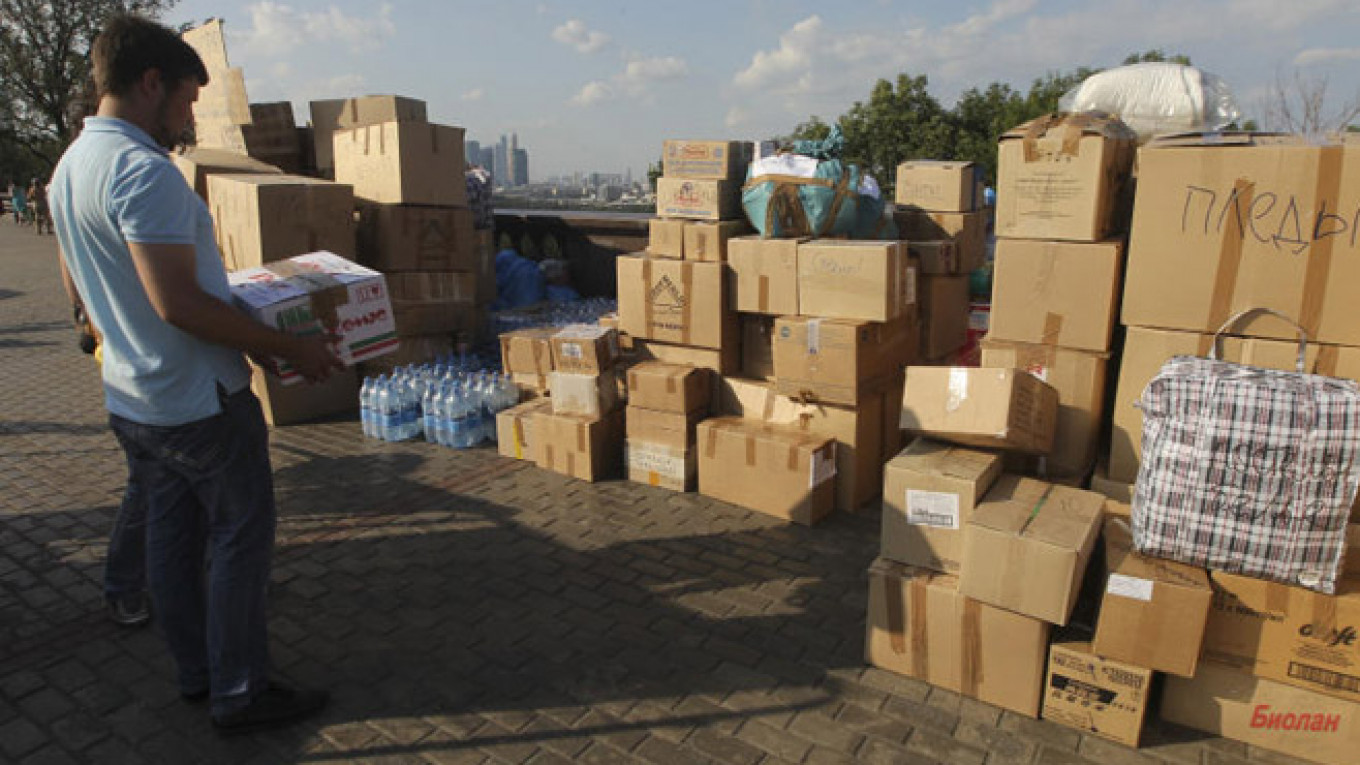Even as Russia's economic crisis sees corporate donations decline dramatically, charitable organization are seeing more and more ordinary Russians step up to the plate.
"The number of donations from big companies has fallen considerably since the beginning of last year," said Victoria Agadzhanova, the executive director of charitable foundation Zhivoi ("Alive").
But the number of donations from individuals has increased and now represents 90 percent of all money given to Zhivoi. Many donations are small, between 5 rubles (0.1 cent) to 150 rubles ($3), according to Agadzhanova.
"Maybe people who have faced [past] crises can better understand those who are in need and therefore are more willing to help them," Agadzhanova said.
Russia's economy is expected to contract by as much as 5 percent this year as low oil prices and Western sanctions over the Ukraine crisis strangle investment.
Private Donations
In the West, individual giving makes up the vast majority of contributions received by charity organizations. For instance, in the United States over 70 percent of donations are private, according to the U.S. National Center for Charitable Statistics.
In Russia the situation is the reverse: 10 percent of all donations are spontaneous private giving, while 90 percent of donations come from corporations and corporate foundations, according to the Russian Donors Forum, a partnership of major Russian and foreign aid organizations working in Russia.
Private donations are typically the main source of funding globally for the World Wide Fund for Nature (WWF). But in Russia individual donations account for only about 11 percent of total giving, according to Olga Bandalova, the head of the membership program at WWF's Russian branch.
But as Russia's crisis grows, more and more people are donating individually to the WWF.
The WWF has seen the number of private citizens donation rise 19 percent in the last 9 months compared to the same period last year, from 17,800 to 22,000 people.
"[There is] an understanding by people that everybody is struggling now but charity organizations are struggling even more," Bandalova said.
Children have traditionally been the main focus of charitable donations in Russia. However, even children's charities have seen a steep decline in donations from companies and businessmen.
Since it was founded in 2006, the charity organization Detskiye Domiki ("Children's Homes"), which provides support to orphanages, has been almost entirely funded by corporate donations. "Before the economic crisis 95 percent of all donations we received were from companies," said Svetlana Rozanova, the director of Detskiye Domiki.
Corporate donations so far this year have fallen to hit 70 percent of total donations.
Detskiye Domiki expects the face value of corporate donations to fall 33 percent this year compared to last year, from around 60 million rubles ($1.2 million) last year to just 40 million rubles ($800,000) this year.
Individual donations are still relatively low, averaging 500,000 rubles ($10,000) a month, but Rozanova says more people are giving than ever before, even if each person is giving less than in past years.
"Some people supporting our organization had to cut their expenses due to the economic crisis, while many others got involved," Rozanova said.
Transparency Brings Money
In March of this year the Donors Forum polled more than 100 Muscovites about their willingness to participate in charity and the forms of participation they prefer.
Over 90 percent of respondents said they would like to help those in need, and over 50 percent of those polled said they would prefer personal involvement rather than cash donations due to the economic difficulties they face.
Many charitable organizations are balancing lower donations by offering opportunities for volunteering. "Now more and more companies are contacting us offering to provide personal assistance rather than money," Agadzhanova said.
Nevertheless, 39 percent of respondents to the Donors Forum poll were ready to provide financial support. The main thing is to know for sure where the money goes, the respondents said.
As well as the population's reduced income, mistrust of charity organizations, caused by lack of transparency, is one of the main obstacles for those who are not involved in charity work.
Overcoming mistrust and cultivating regular giving — rather than the mostly spontaneous giving that dominates Russia — is among the main challenges the public charities face, according to international British nonprofit organization Charities Aid Foundation.
Two months ago Zhivoi launched a website with a new payment system, which allows donors to view real-time transactions and the balance of the organization online. "It increased the percentage of donations in general by 120 percent," Agadzhanova said.
Contact the author at bizreporter@imedia.ru
A Message from The Moscow Times:
Dear readers,
We are facing unprecedented challenges. Russia's Prosecutor General's Office has designated The Moscow Times as an "undesirable" organization, criminalizing our work and putting our staff at risk of prosecution. This follows our earlier unjust labeling as a "foreign agent."
These actions are direct attempts to silence independent journalism in Russia. The authorities claim our work "discredits the decisions of the Russian leadership." We see things differently: we strive to provide accurate, unbiased reporting on Russia.
We, the journalists of The Moscow Times, refuse to be silenced. But to continue our work, we need your help.
Your support, no matter how small, makes a world of difference. If you can, please support us monthly starting from just $2. It's quick to set up, and every contribution makes a significant impact.
By supporting The Moscow Times, you're defending open, independent journalism in the face of repression. Thank you for standing with us.
Remind me later.






